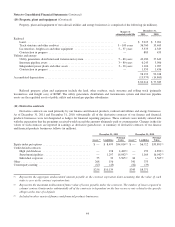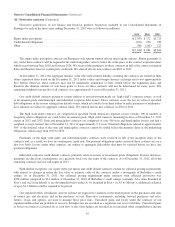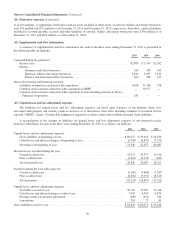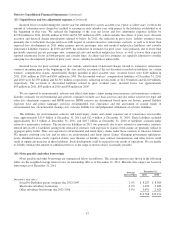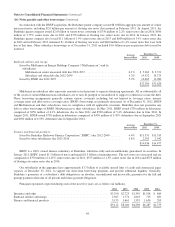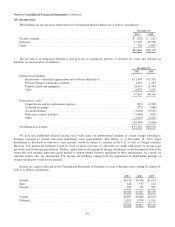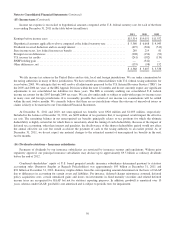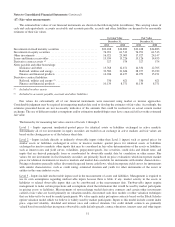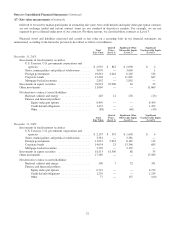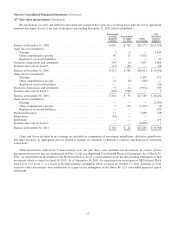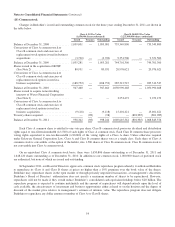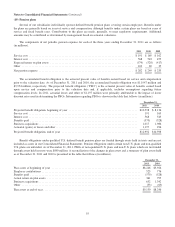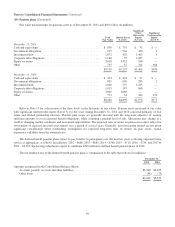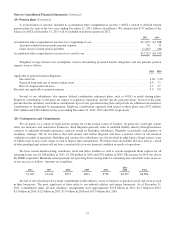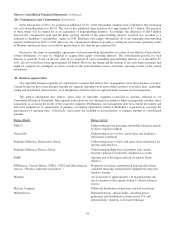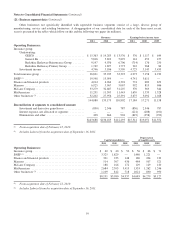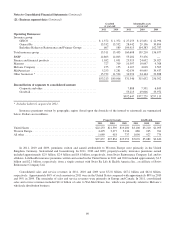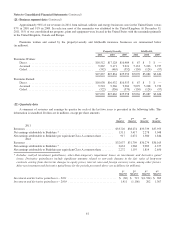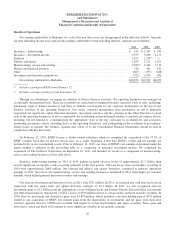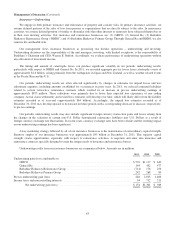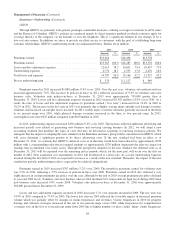Berkshire Hathaway 2011 Annual Report Download - page 56
Download and view the complete annual report
Please find page 56 of the 2011 Berkshire Hathaway annual report below. You can navigate through the pages in the report by either clicking on the pages listed below, or by using the keyword search tool below to find specific information within the annual report.
Notes to Consolidated Financial Statements (Continued)
(18) Common stock
Changes in Berkshire’s issued and outstanding common stock for the three years ending December 31, 2011 are shown in
the table below.
Class A, $5 Par Value
(1,650,000 shares authorized)
Class B, $0.0033 Par Value
(3,225,000,000 shares authorized)
Issued Treasury Outstanding Issued Treasury Outstanding
Balance at December 31, 2008 ............. 1,059,001 — 1,059,001 735,349,800 — 735,349,800
Conversions of Class A common stock to
Class B common stock and exercises of
replacement stock options issued in business
acquisitions .......................... (3,720) — (3,720) 9,351,500 — 9,351,500
Balance at December 31, 2009 ............. 1,055,281 — 1,055,281 744,701,300 — 744,701,300
Shares issued in the acquisition of BNSF
(See Note 2) .......................... 80,931 — 80,931 20,976,621 — 20,976,621
Conversions of Class A common stock to
Class B common stock and exercises of
replacement stock options issued in a
business acquisition .................... (188,752) — (188,752) 285,312,547 — 285,312,547
Balance at December 31, 2010 ............. 947,460 — 947,460 1,050,990,468 — 1,050,990,468
Shares issued to acquire noncontrolling
interests of Wesco Financial Corporation
(See Note 2) .......................... — — — 3,253,472 — 3,253,472
Conversions of Class A common stock to
Class B common stock and exercises of
replacement stock options issued in a
business acquisition .................... (9,118) — (9,118) 15,401,421 — 15,401,421
Treasury shares acquired .................. — (98) (98) — (801,985) (801,985)
Balance at December 31, 2011 ............. 938,342 (98) 938,244 1,069,645,361 (801,985) 1,068,843,376
Each Class A common share is entitled to one vote per share. Class B common stock possesses dividend and distribution
rights equal to one-fifteen-hundredth (1/1,500) of such rights of Class A common stock. Each Class B common share possesses
voting rights equivalent to one-ten-thousandth (1/10,000) of the voting rights of a Class A share. Unless otherwise required
under Delaware General Corporation Law, Class A and Class B common shares vote as a single class. Each share of Class A
common stock is convertible, at the option of the holder, into 1,500 shares of Class B common stock. Class B common stock is
not convertible into Class A common stock.
On an equivalent Class A common stock basis, there were 1,650,806 shares outstanding as of December 31, 2011 and
1,648,120 shares outstanding as of December 31, 2010. In addition to our common stock, 1,000,000 shares of preferred stock
are authorized, but none of which are issued and outstanding.
In September 2011, our Board of Directors approved a common stock repurchase program whereby it authorized Berkshire
to repurchase its Class A and Class B shares at prices no higher than a 10% premium over the book value of the shares.
Berkshire may repurchase shares in the open market or through privately negotiated transactions, at management’s discretion.
Berkshire’s Board of Directors’ authorization does not specify a maximum number of shares to be repurchased. However,
repurchases will not be made if they would reduce Berkshire’s consolidated cash equivalent holdings below $20 billion. The
repurchase program is expected to continue indefinitely and the amount of repurchases will depend entirely upon the level of
cash available, the attractiveness of investment and business opportunities either at hand or on the horizon and the degree of
discount of the market price relative to management’s estimate of intrinsic value. The repurchase program does not obligate
Berkshire to repurchase any dollar amount or number of Class A or Class B shares.
54


